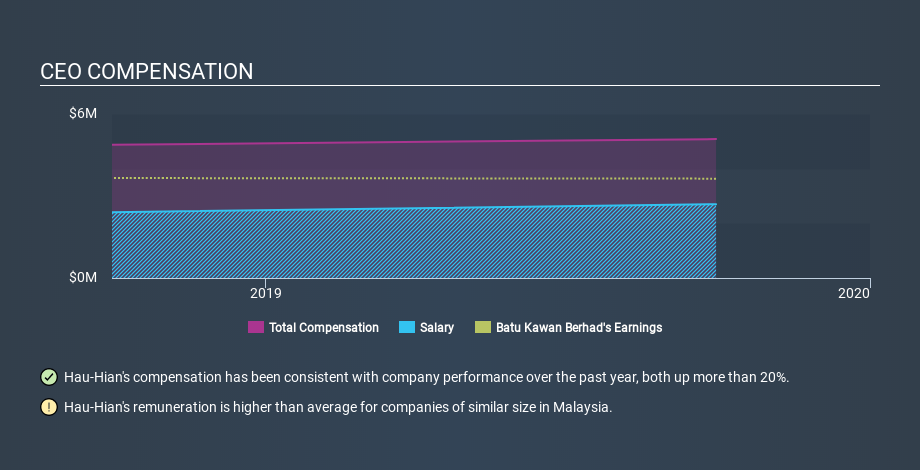Our Take On Batu Kawan Berhad's (KLSE:BKAWAN) CEO Salary

Hau-Hian Lee became the CEO of Batu Kawan Berhad (KLSE:BKAWAN) in 1993. This report will, first, examine the CEO compensation levels in comparison to CEO compensation at companies of similar size. After that, we will consider the growth in the business. And finally - as a second measure of performance - we will look at the returns shareholders have received over the last few years. This method should give us information to assess how appropriately the company pays the CEO.
View our latest analysis for Batu Kawan Berhad
How Does Hau-Hian Lee's Compensation Compare With Similar Sized Companies?
According to our data, Batu Kawan Berhad has a market capitalization of RM6.2b, and paid its CEO total annual compensation worth RM5.1m over the year to September 2019. That's a modest increase of 4.3% on the prior year year. While we always look at total compensation first, we note that the salary component is less, at RM2.7m. We examined companies with market caps from RM4.2b to RM13b, and discovered that the median CEO total compensation of that group was RM2.2m.
It would therefore appear that Batu Kawan Berhad pays Hau-Hian Lee more than the median CEO remuneration at companies of a similar size, in the same market. However, this fact alone doesn't mean the remuneration is too high. We can get a better idea of how generous the pay is by looking at the performance of the underlying business.
The graphic below shows how CEO compensation at Batu Kawan Berhad has changed from year to year.

Is Batu Kawan Berhad Growing?
Batu Kawan Berhad has reduced its earnings per share by an average of 21% a year, over the last three years (measured with a line of best fit). In the last year, its revenue is down 10%.
Sadly for shareholders, earnings per share are actually down, over three years. And the fact that revenue is down year on year arguably paints an ugly picture. These factors suggest that the business performance wouldn't really justify a high pay packet for the CEO. You might want to check this free visual report on analyst forecasts for future earnings.
Has Batu Kawan Berhad Been A Good Investment?
With a three year total loss of 13%, Batu Kawan Berhad would certainly have some dissatisfied shareholders. This suggests it would be unwise for the company to pay the CEO too generously.
In Summary...
We examined the amount Batu Kawan Berhad pays its CEO, and compared it to the amount paid by similar sized companies. Our data suggests that it pays above the median CEO pay within that group.
Neither earnings per share nor revenue have been growing sufficiently to impress us, over the last three years. Arguably worse, investors are without a positive return for the last three years. Some might well form the view that the CEO is paid too generously! CEO compensation is one thing, but it is also interesting to check if the CEO is buying or selling Batu Kawan Berhad (free visualization of insider trades).
Important note: Batu Kawan Berhad may not be the best stock to buy. You might find something better in this list of interesting companies with high ROE and low debt.
If you spot an error that warrants correction, please contact the editor at editorial-team@simplywallst.com. This article by Simply Wall St is general in nature. It does not constitute a recommendation to buy or sell any stock, and does not take account of your objectives, or your financial situation. Simply Wall St has no position in the stocks mentioned.
We aim to bring you long-term focused research analysis driven by fundamental data. Note that our analysis may not factor in the latest price-sensitive company announcements or qualitative material. Thank you for reading.
About KLSE:BKAWAN
Batu Kawan Berhad
An investment holding company, cultivates and processes palm and rubber products in Malaysia, the Far East, the Middle East, South East Asia, Southern Asia, Europe, North and South America, Australia, Africa, and internationally.
Mediocre balance sheet low.
Similar Companies
Market Insights
Community Narratives



